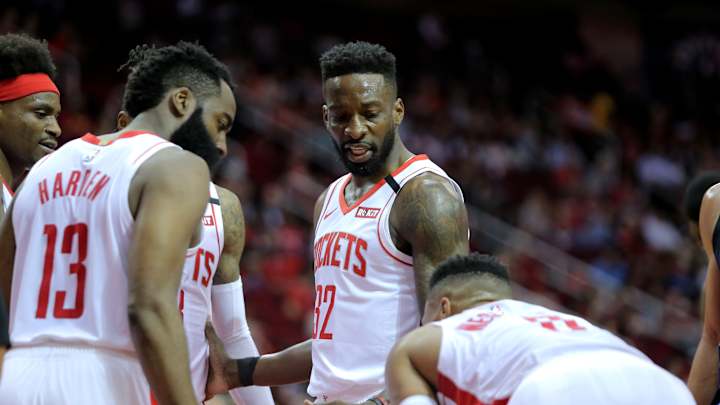Who Will Make the Cut in Mike D'Antoni's Playoff Rotation?

Rockets head coach Mike D'Antoni is one of the NBA's most accomplished active coaches, though his decision making isn't completely beyond reproach. Just ask Shawn Marion.
The former Suns forward criticized D'Antoni for his deployment (or lack thereof) of Phoenix's bench in the 2005 playoffs, a year that ended with a Western Conference finals loss to the Spurs. Phoenix won 62 regular-season games in 2004-05, marking the best team of the D'Antoni era. But in the postseason, D'Antoni's short rotation took its toll.
"The whole team was drained, because we was on a seven-man rotation," Marion told The Athletic's Michael Lee on May 11. "There was no way we was winning a championship with a seven-man rotation in the postseason. ...We didn’t have anything left in the tank.
D'Antoni has squeezed more out of his bench in Houston, though he still trends toward the shorter side when it comes to his playoff rotation. Just eight Rockets played over 10 minutes per game in the 2019 playoffs. The same goes for 2018. This isn't necessarily a criticism of D'Antoni, who will likely win his 50th postseason contest in 2020. But his history is worth noting. When the chips are down, don't expect D'Antoni to turn to his bench.
The Rockets appear better equipped to keep their starters fresh in the 2020 playoffs compared to previous seasons. Houston's rotation is legitimately eight players deep, even as Ben McLemore's defensive limitations threaten his postseason playing time. Could anybody else force D'Antoni to expand his rotation past the top eight? Let's examine the candidates.
Jeff Green
The former No. 5 pick's NBA odyssey continued in Houston this season, with a post-trade-deadline signing marking his ninth team in 12 seasons. And Green quickly made a contribution to the Rockets. The Georgetown product is averaging 10.4 points per game in 20.1 minutes, shooting 41.2% from three. The proficiency from deep is nice, though it's not Green's primary benefit to the Rockets. He's served as an impactful small-ball five when P.J. Tucker sits, displaying an impressive proficiency both as a roll-man and off the bounce. Green's defensive impact (and effort) can be questioned. But he's undoubtedly a positive offensive asset alongside James Harden and Russell Westbrook.
Green never lived up to his billing as an early lottery pick, and he's frustrated plenty of coaches with a propensity to float in and out of games. Though considering his significant playoff experience–including a clutch performance with Cleveland in Game 7 of the 2018 Eastern Conference finals–it would be surprising not to see Green earn legitimate minutes in Houston's playoff rotation.
DeMarre Carroll
Carroll was the Rockets' other buyout addition following February's trade deadline, though his path to playing time is less clear. He logged four DNP-CD's with Houston in 10 potential appearances from Feb. 20 to March 10, and his skill set doesn't give him a marked advantage over the rest of Houston's bench. Green is a more skilled scorer and playmaker. Thabo Sefolosha is a better defender, and he has the benefit of continuity after a full season in Houston. Carroll could spend the postseason largely as a cheerleader.
The 11-year veteran will need to rely on his jump shot to earn significant postseason playing time. He averaged 16.5 minutes per game in a trio of contests in early March, a period in which he made eight of 14 shots. The sample size is (of course) small, though it could be telling. D'Antoni won't have much patience with the end of his bench in the postseason. If Carroll starts cold, he could be buried in the Rockets' rotation.
Thabo Sefolosha
Sefolosha and Carroll are likely battling for the same minutes, though Sefolosha could get the nod if he is deployed as a center in limited minutes. He sports a solid 106.7 defensive rating–second among Houston rotation players–and the Rockets are outscoring teams by 12.8 possessions when he and Harden share the floor. Sefolosha also has the benefit of spending all of 2019-20 with Houston, a potential advantage over Carroll or Green. Sefolosha's playing time may be minimal, though he could see the floor at some point in the postseason.
Isaiah Hartenstein
We're now into the long shots bin, but let's make a brief case for the 22-year-old center. Hartenstein is the lone legitimate five in D'Antoni's potential rotation–no disrespect to 37-year-old Tyson Chandler–and he's a true threat in the pick-and-roll. Hartenstein has the athleticism to punish teams above the rim, though his soft hands in the lane are his best asset. Watch Hartenstein roll, gather and score, and the outline of a quality center is evident.
Perhaps Hartenstein would be a positive offensive addition, but it's unlikely Houston is searching for scoring punch in the playoffs. Any minutes for a true center would go to a plus defender, and Hartenstein doesn't exactly fit the bill in that regard. He's still quite raw as a team defender, and he's frankly a foul machine at this point in his career. Unless the Rockets look to hack Dwight Howard or another big man, don't expect to see Hartenstein on the floor in the playoffs.
Bruno Caboclo
Caboclo is an enticing piece for 2020-21, sporting a mammoth wingspan and impressive athleticism on the wing. But six years after being "two years away from being two years away," Caboclo still isn't ready for the bright lights of the playoffs. He's logged largely garbage-time minutes with the Rockets, and he's yet to make a three in five appearances. Houston will remain patient with Caboclo. He could make a true impact next season. For now, he'll be tethered to the end of the Rockets' bench.
